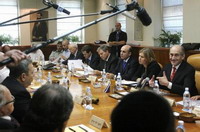International donors to recover Palestine
International donors with the help of Europe on Monday pledged US$7.4 billion (5.1 billion EUR) over the next three years to help stateless Palestinians as new peace talks begin with Israel .

World leaders at the conference urged Israel to ease restrictions on Palestinian movement in the West Bank and Gaza Strip, otherwise donors may be wasting their money.
Palestinian President Mahmoud Abbas used the session to demand that Israel freeze building in Jewish settlements without excuses or exception. Palestinians are outraged by Israel 's announcement, within days of the formal start of the new peace effort, that it planned hundreds of new Jewish houses in east Jerusalem .
"It's the moment of truth," Abbas told some 90 donor countries and international organizations gathered in Paris . "I'll be eager to implement all our commitments," Abbas said, and "I expect them to stop all settlement activities, without exceptions."
The pledges are meant to help the smaller territory become an eventual independent Palestinian state alongside Israel .
Abbas ruled out dialogue with Hamas, and warned that without international support Gaza is "heading into disaster."
Gaza has been virtually cut off from the world since the Hamas takeover in June. Israel and Egypt sharply restricted border access in response, and the blockade has further deepened poverty there.
The aid pledged will include money for Gaza , Palestinian officials said. It also includes countries' contributions to U.N. and other international humanitarian agencies.
Israel pledged no money, but the chief Israeli negotiator outlined hopes for cooperation with Palestinians.
"We need you to know that Palestinian welfare and Israeli security are not competing interests; they are interconnected ones," Israeli Foreign Minister Tzipi Livni told delegates. "We have no desire to control Palestinian lives. We do not want the image of Israel in the Palestinian mind to be a soldier at a checkpoint."
International peacemakers meeting on the sidelines of the conference said movement must be freer and expressed dismay at the east Jerusalem new housing plan. The group that includes the United Nations, United States , European Union and Russia also said the humanitarian situation in the sealed-off Gaza Strip is urgent.
The language of a statement issued by the group was unusually sharp, and contrasted with the celebratory atmosphere as organizers tallied the pledges.
The pledges include $3.4 billion (2.3 billion EUR) for 2008, the year that both sides have said they want to use to reach peace.
European nations pledged more than US$3 billion (2 billion EUR), including US$650 million (440 million EUR) from the European Union alone, in 2008. Similar levels were expected for 2009 and 2010.
The United States pledged US$555 million (382.5 million EUR). The U.S. money includes about US$400 million (275 million EUR) that the White House already announced but has not been approved by Congress.
"This is generous. It is a vote of confidence for the program, and a sign of solidarity on the Palestinian question," Palestinian Planning Minister Samir Abdullah told The Associated Press.
Palestinian Prime Minister Salam Fayyad had asked for US$5.6 billion (3.8 billion EUR) over three years.
Always dependent on international handouts, the Palestinian economy is in much worse shape since the last serious run at peace and statehood seven years ago.
Fayyad has been assuring donor countries that they are not expected to prop up the Palestinian government indefinitely. International donors have given more than US$10 billion (7 billion EUR) to the Palestinians over the past decade only to see large amounts wasted. Once built, some projects withered under new restrictions on Palestinian movement imposed by Israel . Some were destroyed in fighting.
Fayyad said 70 percent of the aid would initially go to reducing his huge budget deficit, with the emphasis shifting only gradually to development projects. He said he needs cash quickly to keep the government afloat.
The United States pledged US$150 million (104 million EUR) in direct aid for the moderate Palestinian government based in the West Bank next year. That is a departure for the United States , which has provided little direct aid in the past because of corruption and cronyism throughout the Palestinian leadership.
Fayyad has installed financial reforms and put the sprawling and inefficient Palestinian government on an austerity diet. Fayyad was appointed prime minister this summer after the split with Hamas, which won Palestinian parliamentary elections nearly two years ago. The elected Hamas prime minister, Ismail Haniyeh, claims legitimacy. Abbas accuses Haniyeh of a coup d'etat in Gaza .
The United States insists the chaos is an opening.
"This is the most promising opportunity to seek peace that we have had in nearly seven years, and we need to seize it," Rice told the conference organized by Mideast envoy Tony Blair, the former British prime minister.
Subscribe to Pravda.Ru Telegram channel, Facebook, RSS!


